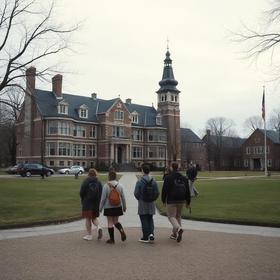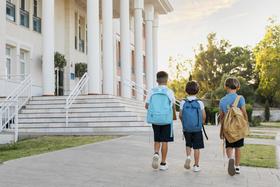Boarding Schools and Cell Phone / Social Media Policies: What’s Changing in 2025-26
In 2025-26, boarding schools across the U.S. and around the world are increasingly revising their policies on cell phones and social media use. Growing concerns over student mental health, academic focus, cyberbullying, and digital distraction are driving changes. This article examines what’s shifting, with examples, expert commentary, and guidance for parents, students, and educators.
Key Drivers of Policy Change
Several interrelated factors are prompting boarding schools to update their cell phone and social media policies in 2025-26:
Mental health concerns: Surveys show rising levels of anxiety, depression, and social isolation among youth, often tied to social media use. Boarding schools are responding by restricting or more closely managing access.
Academic focus and distractions: There is growing evidence that cell phones during instructional or study times degrade attention spans, disruption, and academic outcome.
Legislation & regulation: At the state and national levels, new laws address age limits, platform responsibilities, and school obligations regarding social media and device use.
Parental and community pressure: Parents increasingly expect schools to set boundaries on screen time. Students too are vocal in some settings about needing “phone-free” times.
Equity and fairness: Ensuring all students have similar access, and that device rules don’t unfairly disadvantage those without resources or accommodating special needs, is a growing focus.
U.S. Trends & Legislative / Regulatory Moves
While much of what follows comes from public or day schools, many trends are relevant for boarding schools preparing updates in 2025-26.
| Policy / Law | What It Requires / Changes | Relevance to Boarding Schools |
|---|---|---|
| Kids Off Social Media Act (Proposed S. 278, 2025-26) | Would prohibit children under 13 from being on social media; ban certain recommendation algorithms for those under 17; require schools to limit social media access. Congress.gov | Boarding schools may need to adjust social media-based assignments, communication channels, or access during school hours. |
| Parental Rights in Social Media Act, Nebraska | Requires age verification for social media users under 18; parental consent; parent oversight of minor's account. Takes effect July 1, 2026. Wikipedia | Schools must prepare for increased parental involvement and oversight. Boarding schools with students from multiple states may face different regulatory regimes. |
| Protecting Kids on Social Media Act (Tennessee) | Age verification, parental consent, privacy settings, default protections for minors using platforms. Wikipedia | A model for what boarding schools are expected to mirror in their internal social media policies. |
| State cellphone laws & “bell-to-bell” bans | Several states require schools to have formal policies that restrict or ban phones for the full school day (“bell-to-bell”) or during instruction. E.g. Massachusetts proposed STUDY Act; new restrictions in 17 states plus DC for 2025 school year. Mass.gov | Boarding schools are likely to adopt or strengthen “no phones during classes / study halls” policies; may also set clear rules for free time, meals, dorms. |
What Boarding Schools Are Doing Differently
Boarding schools face unique challenges and opportunities when it comes to cell phone and social media policy. Their residential nature means students are on campus 24/7, so policies extend beyond classroom hours into dorms, nights, weekends, and free time. In 2025-26 we observe several shifts:
Structured “phone-free” zones and hours
Many boarding schools are designating times (e.g., study halls, meals, evenings) when cell phones must be off or stored. Social media access might also be limited during these periods.Dorm policies tightening
Some boarding schools are implementing stricter dorm phone rules: locking away devices overnight, restricting social media usage at night, or requiring phones to be in airplane mode after lights-out.Digital supervision & privilege systems
Schools are refining privilege-based access: good behavior or academic performance can earn “phone time” or social media access; sanctions reduce privileges when rules are broken.Educational / health exemptions
Recognizing that some students need phones for mental health, family communication, or academic work, policies increasingly carve out exceptions, but with clear processes for approval.Monitoring & accountability
More schools are requiring transparency in how phones are used (e.g., what social media, when) and ensuring consequences are enforced fairly. In some cases, schools are using secure storage solutions or signal-blocking pouches during class.Collaboration with parents & students
Boarding schools are engaging their communities to develop or revise cell phone and social media policies—surveying students, involving parents, and explaining rationale to reduce resistance and enhance buy-in.
Examples from Boarding Schools & Comparable Institutions
St. Edward’s School, Oxford (UK): As part of an initiative to curb smartphone addiction, St. Edward’s reintroduced landlines in boarding houses. In 2025, the school restricted smartphone use for younger students during the week, and limited access on weekends. The Times
Finland: From August 2025, Finnish law restricts mobile phone use in schools during lesson times unless permitted for educational or health purposes; schools must set rules on devices during breaks. While Finland’s system covers day schools, it reflects a policy environment boarding schools may find parallels with. The Guardian
Challenges & Considerations for Boarding Schools
Implementing new or stricter policies involves trade-offs and must account for boarding specificities:
Privacy vs well-being: Students need privacy, especially in older dorm settings; overly strict surveillance or control can erode trust.
Parent relationships: Families expect access; limiting communication may cause anxiety or concern. Clear policies and communication are essential.
Technological constraints: Some schools may not have infrastructure to enforce restrictions (e.g., locking storage, secure Wi-Fi filtering).
Special needs and safety concerns: Students with medical, mental health, or accessibility needs may require flexible access. Overnight emergencies or parental contact must be possible.
Enforcement burden: Staff need training; rules must be consistent across departments (dorms, classes, extracurriculars) to avoid confusion.
What’s New in 2025-26: Key Shifts
Here are the newest or strengthening trends boarding schools should note in 2025-26:
Bell-to-bell / full-day device bans: More institutions and jurisdictions are pushing for phone restrictions that cover the entire school day (not just class time). Boarding schools may extend this concept to study periods and structured free time.
Regulation of social media platforms’ features for minors: Laws like age verification, limiting “addictive feeds,” curbing notifications during school or rest hours are being proposed or enacted. Schools are aligning policies (e.g. forbidding assignment use of social media apps that push algorithmic feeds).
Use of phone storage or signal blocking: Secure storage, lockers, designated boxes or pouches during class or other restricted times are increasingly used to enforce policy.
Greater transparency and communication: Schools are publishing clear handbooks, involving students in rule-making, and setting expectations early (during orientation) about digital behavior.
Policy integration into wellness & mental health programs: Policies are less about punishment and more about promoting well-being. Some schools include digital hygiene as part of student wellness curricula.
Recommendations for Boarding Schools
For schools revising boarding school cell phone social media policy changes in 2025-26, here are best practices:
Start with stakeholder consultation: Involve students, parents, faculty, dorm staff in drafting or revising policies. This improves acceptance.
Define clear zones and times: Clarify when phones/social media are allowed, and when they are not — classes, meals, study halls, evenings, dorms.
Make exceptions explicit: For health, family communication, academic use. Have transparent approval processes.
Align with regulatory/legal requirements: Be aware of state, national laws (e.g., laws about minors on social media, platform responsibilities). Boarding schools with international students should note foreign regulations too.
Use practical enforcement tools: E.g. lockers, pouches, signal blockers, or supervised storage. Train staff to enforce fairly; avoid disproportionately penalizing students.
Embed digital well-being education: Teach students about social media risks, digital citizenship, time management, mental health, privacy.
Review & iterate: Collect feedback, monitor incidents of misuse, well-being metrics, academic performance, and adjust policies accordingly.
What Parents and Students Should Ask
To understand a boarding school’s updated cell phone and social media policy (2025-26), parents/students may ask:
What are the allowed times and spaces for phone/social media use (class, study hall, meals, evening, weekends)?
Are there age- or grade-based privileges or restrictions?
What is the process for exceptions (medical, academic, personal)?
How will misbehavior or rule violation be handled? What are the consequences?
How does the school partner with parents in oversight and communication?
What support exists for student mental health related to digital use?
Looking Forward: What Might Be Next
More federal regulation: Proposed U.S. federal bills may make stricter rules the norm, especially around social media platform requirements or children’s access.
International harmonization: Schools with students from multiple countries may face overlapping or conflicting rules; pressure may build for more standardized policies.
Technological solutions embedded in education platforms: School apps that restrict social media use or monitor time; AI tools for identifying problematic use.
Greater focus on after-school and weekend policies: Historically less regulated, but boarding schools are likely to extend control or guidance into free time to support rest and social interaction.
Summary
Boarding school cell phone social media policy changes in 2025-26 are centered on tighter restrictions, greater alignment with mental health goals, legal compliance, structured usage times, and more transparency. While policies vary widely, the trends point toward restricting access during instructional and rest periods, regulating social media platform behavior, and ensuring policies are implemented fairly and humanely. For parents and students, understanding these changes and asking the right questions is important. For educators and administrators, the best policies will balance safety, well-being, academic focus, and respectful autonomy.















